DOTTED, SPOTTED AND FLAVOURED
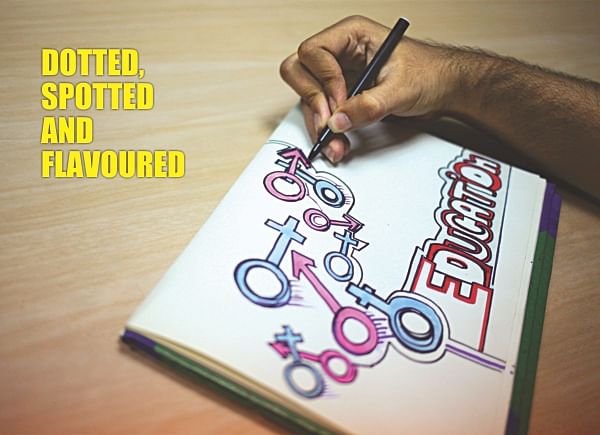 Photos: Kazi Tahsin Agaz Apurbo
Photos: Kazi Tahsin Agaz Apurbo
I still remember the first time I came across the word 'sex.' It was in a Sidney Sheldon book, the juicy details and the guilty curiosity of reading something taboo. In school, we were frowned upon for discussing it; biology classes were particularly enlightening. The boys in my class had their boro bhais and the magical land of pornography – which, by the way gives all sorts of misconstrued information on things that cannot happen to people in real life – and girls would merely giggle or blush when 'sex' was on the table. Then, of course, American Pie happened and we grew up believing 'sex' could only result from booze, break ups and bad people.

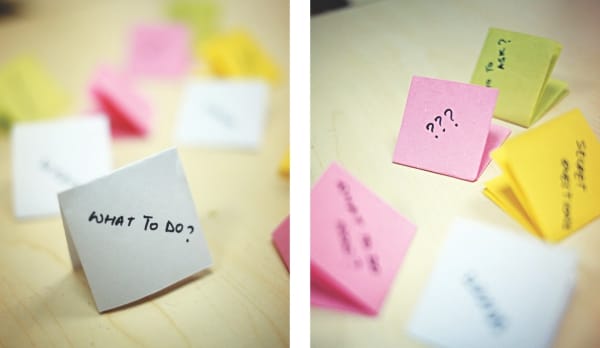 Using chits of paper to ask questions anonymously is a good way to introduce sex education in the classroom.
Using chits of paper to ask questions anonymously is a good way to introduce sex education in the classroom.
It wasn't until mid-teens that the concept became clearer. It was no longer about good or bad, rather a process that we all experience at one point or the other. It wasn't taboo, rather required maturity and sincerity. It wasn't evil, rather an expression and required understanding. While in our schools, sex is talked in the context of reproduction and sexually transmitted diseases only, it never touches upon pleasure or desire. We have been taught sex is inherently private, whereas in reality, sex is anything but private. It's available on the streets in small chits of blue and red papers thrown inside bus windows, it's available online, and it's available at tong er dokan addas. Ironically, it isn't available in the one place where it could have the most positive impact – in our classrooms.
 Let's ask ourselves a simple question—why should information and knowledge be repressed when it comes to understanding sex and sexuality, given sex is present in practically all of our lives? Today, information is said to be available in a flurry of words and images on the Internet, but it is easy to get more confused than informed and end up with the wrong idea. Teenagers and young adults often feel anxious regarding aspects of body and feelings. And the most problematic thing is that there is no one to talk to—not parents, not teachers. The only sources one can rely on are elder siblings, cousins and friends and of course pornography. More often than not, such a learning method (conducted with doses of secrecy and confusion) fails to deliver messages of mutual understanding and respect, which is what sex is essentially about. Won't it be more effective and helpful if sex was just talked about in the classroom, by fostering an environment that does not have any trace of shame, embarrassment and judgment? Talking about sex in the classroom does not necessarily mean that teachers will be encouraging students to go for pre-marital sex (which is often the common argument), but it would make students better prepared, aware and understanding of things like the body, gender, sex and sexuality. It is natural, and with the right information, can actually do more good than harm.
Let's ask ourselves a simple question—why should information and knowledge be repressed when it comes to understanding sex and sexuality, given sex is present in practically all of our lives? Today, information is said to be available in a flurry of words and images on the Internet, but it is easy to get more confused than informed and end up with the wrong idea. Teenagers and young adults often feel anxious regarding aspects of body and feelings. And the most problematic thing is that there is no one to talk to—not parents, not teachers. The only sources one can rely on are elder siblings, cousins and friends and of course pornography. More often than not, such a learning method (conducted with doses of secrecy and confusion) fails to deliver messages of mutual understanding and respect, which is what sex is essentially about. Won't it be more effective and helpful if sex was just talked about in the classroom, by fostering an environment that does not have any trace of shame, embarrassment and judgment? Talking about sex in the classroom does not necessarily mean that teachers will be encouraging students to go for pre-marital sex (which is often the common argument), but it would make students better prepared, aware and understanding of things like the body, gender, sex and sexuality. It is natural, and with the right information, can actually do more good than harm.
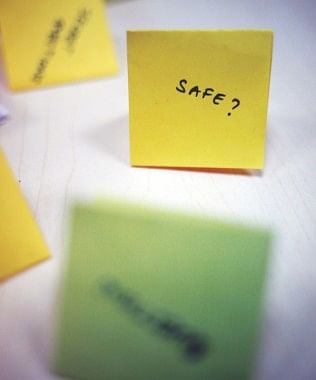 Growing up, very little was said about menstruation or masturbation. I remember a typical session in a local school once when all the boys were taken out of the classroom and girls given a lecture on hygiene and proper disposal. Most were confused, because not once during the lecture, the world 'period' was uttered – and in spite of good intentions, what could have been an incredible example of introducing sex and sexuality in the classroom turned out to be a very confusing gathering of people. Sure, most girls can ask their mothers about it – but the fear, anxiety and complexity of not being able to ask upfront or never been explained of it makes a very normal biological process seem like something to be ashamed of and avoided (which is strange, because girls can't exactly 'avoid' having menstruation). On the flipside, boys don't even have that. No parents, no teachers and friends are more mischievous than they would like to me. In the embarrassment of having their first wet dream or their 'little man' saluting, most boys resort to pornography, which eventually leads them into believing girls are objects of sexual pleasure, their 'little man' is forever 'little' and the lion always purrs in bed. Reality therefore, is nothing more than a series of disappointments and confusions, until one day, the boy turns into a man and miraculously grows up.
Growing up, very little was said about menstruation or masturbation. I remember a typical session in a local school once when all the boys were taken out of the classroom and girls given a lecture on hygiene and proper disposal. Most were confused, because not once during the lecture, the world 'period' was uttered – and in spite of good intentions, what could have been an incredible example of introducing sex and sexuality in the classroom turned out to be a very confusing gathering of people. Sure, most girls can ask their mothers about it – but the fear, anxiety and complexity of not being able to ask upfront or never been explained of it makes a very normal biological process seem like something to be ashamed of and avoided (which is strange, because girls can't exactly 'avoid' having menstruation). On the flipside, boys don't even have that. No parents, no teachers and friends are more mischievous than they would like to me. In the embarrassment of having their first wet dream or their 'little man' saluting, most boys resort to pornography, which eventually leads them into believing girls are objects of sexual pleasure, their 'little man' is forever 'little' and the lion always purrs in bed. Reality therefore, is nothing more than a series of disappointments and confusions, until one day, the boy turns into a man and miraculously grows up.
Funny thing though, very few classrooms across the globe have genuinely mastered the art of sex education. In a West London school, as reported by The Guardian, 10-year old pupils were asked to anonymously ask questions (and place inside a box) under the compulsory Sex and Relationships Education (SRE) curriculum, and most ended up asking where babies came from or when their pubic hair would grow. It wasn't about 'sex', as notoriously assumed, but about the changes our bodies experience and our growing desires. In higher classes, for example, the questions were more varied, ranging from wet dreams to whether it's sinful to touch 'special parts'. In Bangladesh, if a similar process was introduced, what would be its implications?
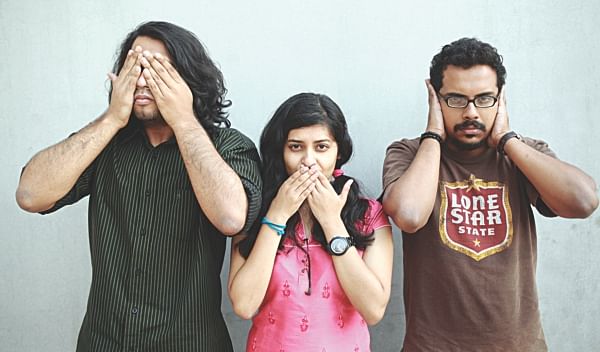 See no evil, speak no evil, hear no evil- sex education is often condemned to ‘evil’ when it shouldn’t be. Photos: Kazi Tahsin Agaz Apurbo
See no evil, speak no evil, hear no evil- sex education is often condemned to ‘evil’ when it shouldn’t be. Photos: Kazi Tahsin Agaz Apurbo
“I think I would initially feel very shy, but provided we have honest and open discussions, I would gradually warm up to it,” responds 20-year old Anusheh Hossain. Anusheh, having been taught in an English-medium school that follows an international curriculum learnt about sex through reading books and watching movies. In her teens, her cousins and she would discuss it late into the night, giggle over it and condemn it as the 'forbidden topic.' “If my class could just talk about sex freely instead of whispering about it, I think I'd spend those late nights doing something more useful and grown up with the right information.”
“I'm not sure whether Bangladeshi children would participate as actively in SRE as they did in the UK,” says 21-year old Saif Muhammed. Saif studied in a government school under the national curriculum and first came across sex on stumbling upon an elder cousin's computer in his early teens. “I understand pornography isn't the best teacher – but our culture is inherently influenced by religion, judgmental neighbours and conservative aunties. To break out of our historic nature and embrace SRE in a positive way, and not as an excuse to dump girls, will be extremely difficult.”
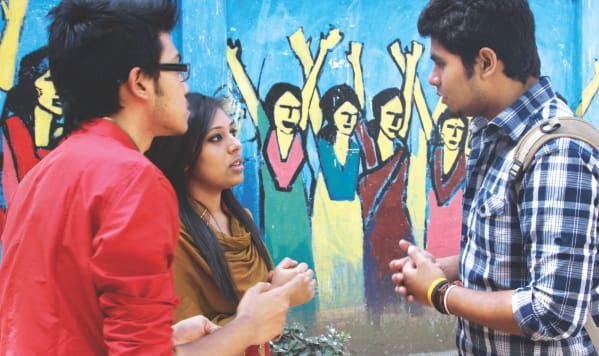 Conversations in a safe space can overcome confusions about sex amongst young people.Photos: Kazi Tahsin Agaz Apurbo
Conversations in a safe space can overcome confusions about sex amongst young people.Photos: Kazi Tahsin Agaz Apurbo
In spite of the difference of opinions, the importance of sex education cannot be denied. Yes, girls and boys fall in love and yes, they do end up 'making love.' It's much better 'doing it' safely than regretting it; it's much better taking the right precautions instead of fretting over unnecessary hospital bills. Furthermore, it's much better accepting its existence than completely denying it, and creating a safe space to talk about it. Curiousity is dangerous as long as there are unresolved questions, and once the cat is out, there is little to explore and more to decide. Problems of marital rape are also tied to the fact that men do 'it' anyways when their wives don't want 'it,' because it is expected of the woman (no, the certificate of marriage does not compensate for non-consensual sex). Women aren't 'characterless' because they talk about sex, and men aren't 'perverts.' Surely, there is an approach – and if not taught about it, our population will forever be suffering from misled assumptions about the opposite sex.
So, how can we do it? Suggestion boxes in classrooms are a great way to start, next to actually naming what the topic is, on the table. Picture books and simple animations (now widely available online) are good resources for children, while elder siblings and parents can do their part for teenagers. Additionally, having a more open-minded biology teacher can also add great value to learning – and reassurance of actually getting answers can foster after-school learning between teachers, parents and students. Instead of complaining about the 'lost generation' or the 'eve teasers', it's worth taking a step back and solving the problem at its root. Our only contender is pornography, and we're certainly better educators than that.
 A suggestion box in the classroom can lead to interactive sessions amongst teachers and students. Photos: Kazi Tahsin Agaz Apurbo
A suggestion box in the classroom can lead to interactive sessions amongst teachers and students. Photos: Kazi Tahsin Agaz Apurbo

 For all latest news, follow The Daily Star's Google News channel.
For all latest news, follow The Daily Star's Google News channel. 



Comments